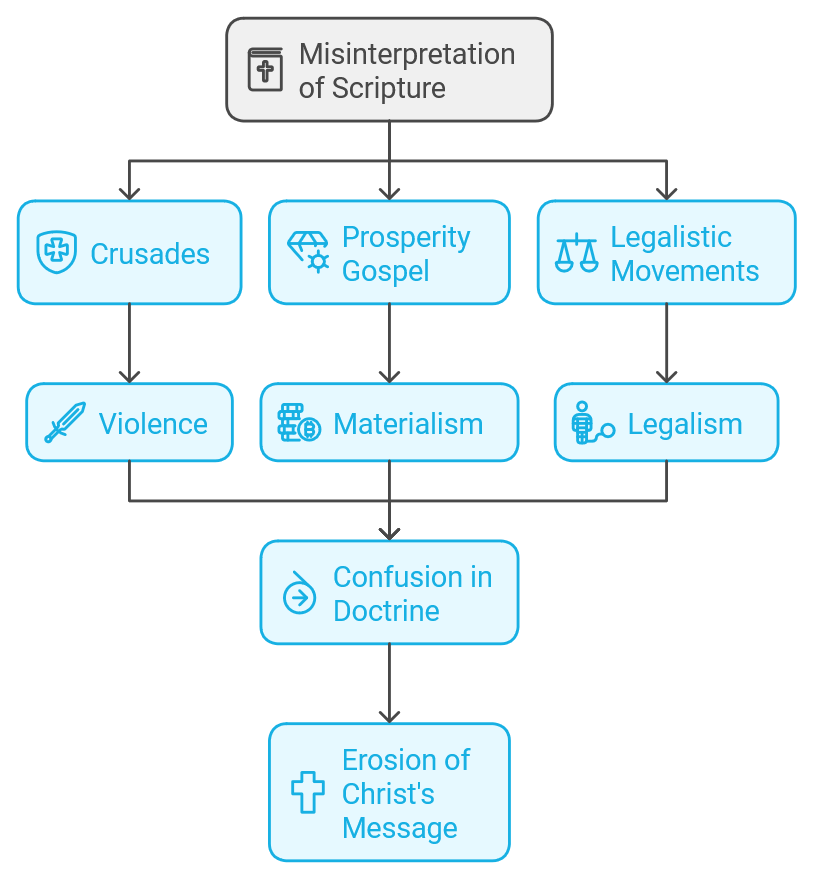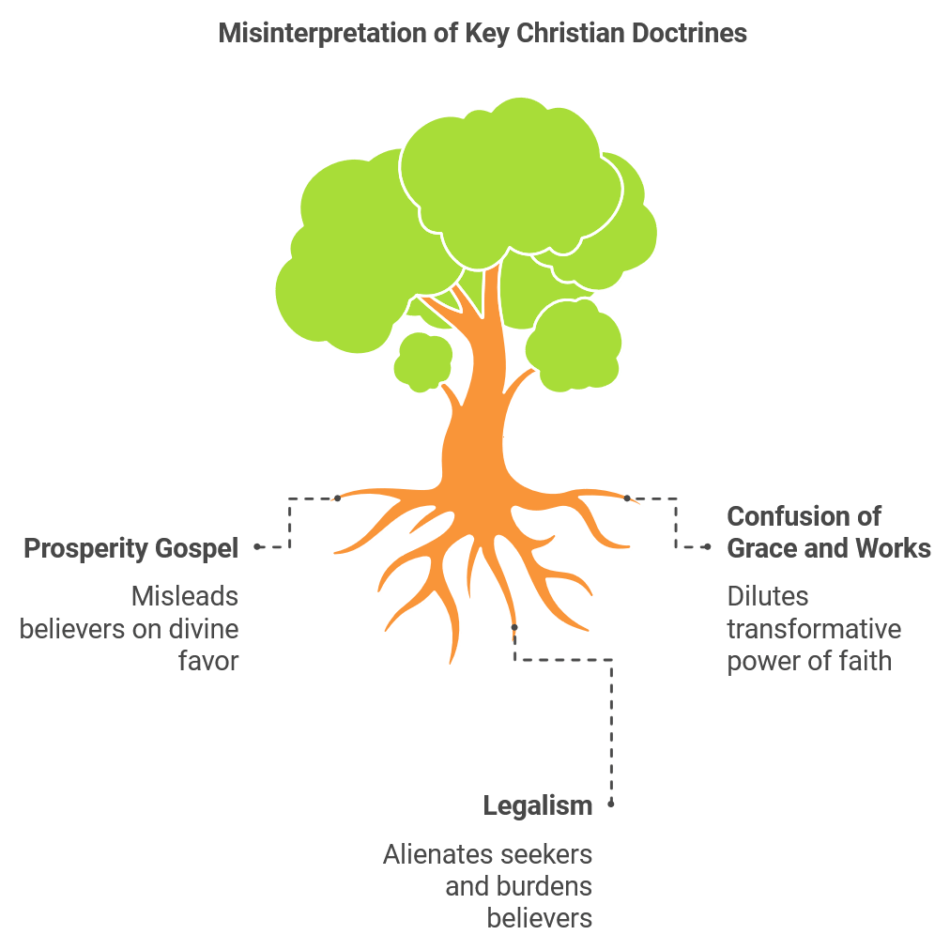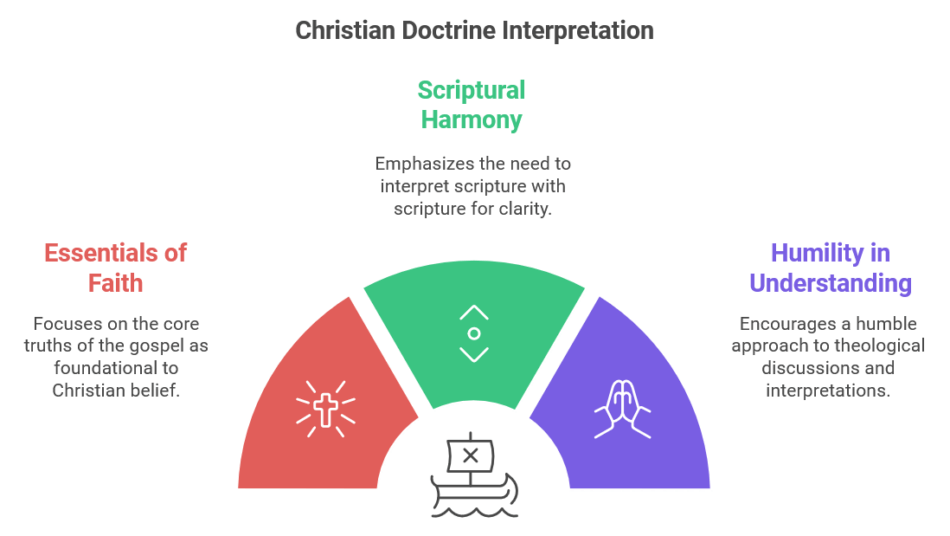Have you ever wondered if what we practice as Christianity today reflects what Christ and the early Church envisioned? Is the doctrine of Christian faith being misinterpreted to suit human preferences rather than divine purposes? This question isn’t just a theological exercise—it strikes at the core of how billions live out their faith.
Throughout history, the interpretation of Christian teachings has sparked revolutions, divided denominations, and fueled theological debates. Yet, could we be following a misunderstood version of the faith that Jesus taught? By examining biblical doctrine clarity, historical context, and common faith-based misconceptions, we will uncover whether misinterpretation is leading us astray.
The Roots of Misinterpretation
A Faith Built on Scripture: Or Is It?
The Bible is the cornerstone of the Christian faith, yet its interpretation has caused centuries of division. 2 Peter 1:20-21 warns, “No prophecy of Scripture comes from someone’s own interpretation. For no prophecy was ever produced by the will of man, but men spoke from God as they were carried along by the Holy Spirit.”
Despite this, history reveals countless instances of the Bible being twisted to fit agendas:
- The Crusades justified violence using biblical rhetoric.
- The prosperity gospel warps spiritual truths for material gain.
- Legalistic movements burden believers with traditions, sidelining grace.
These examples reflect how a misinterpretation of scripture leads to confusion in Christian doctrine, eroding the essence of Christ’s message: “I am the way, the truth, and the life” (John 14:6).

Theology and Misinterpretation: Who Decides Doctrine?
In the early Church, debates over key doctrines were common. The Council of Nicaea (AD 325) resolved disputes over Christ’s divinity, shaping the Nicene Creed. However, it also set a precedent for human intervention in defining theology.
Modern Christian teachings explained through various lenses—Catholic, Protestant, and Evangelical—often reveal stark differences. If the doctrine of Christian faith depends on interpretation, can we claim theological purity?
Consider this: the role of faith in Christianity is personal, but when tradition overrides Scripture, misinterpretations arise. This begs the question: Are we clinging to human constructs over God’s eternal truth?
Key Areas Where Misinterpretation Thrives
1. The Prosperity Gospel: A Blessing or a Blight?
The prosperity gospel claims that faith guarantees wealth and health, often citing verses like Jeremiah 29:11, “For I know the plans I have for you… plans to prosper you.”
However, this selective reading ignores the broader context: God’s plans often involve suffering for spiritual growth (Romans 5:3-4). Misunderstandings in religious faith can mislead believers into equating material success with divine favor.
2. Misunderstanding Grace and Works
Some view grace as a license to sin, while others emphasize works over faith. Yet, the Bible teaches a balance: “For it is by grace you have been saved… not by works” (Ephesians 2:8-9).
Faith without works is dead (James 2:26), but works must flow from genuine faith, not self-righteousness. This confusion in Christian doctrine shows how misinterpretation dilutes the transformative power of the gospel.
3. Legalism: The Modern Pharisee Problem
Many Christians unknowingly adopt legalistic attitudes, turning faith into a checklist of rules. Jesus condemned this in the Pharisees, saying, “You nullify the word of God for the sake of your tradition” (Matthew 15:6).
Legalism overlooks the heart of the gospel: love, mercy, and relationship with God (Hosea 6:6). Misinterpretation here alienates seekers and burdens believers with guilt instead of freedom.

The Historical Context of Christian Beliefs
Why Context Matters
Failing to consider historical and cultural context leads to distorted doctrine. For example:
- Slavery and the Bible: Misused to justify oppression, ignoring principles of equality in Christ (Galatians 3:28).
- Women in Ministry: Debates arise from selective readings of texts like 1 Timothy 2:12, often ignoring the broader narrative of women leading in Scripture (e.g., Deborah in Judges, Priscilla in Acts).
Understanding Christian beliefs requires us to read Scripture as it was intended: through the lens of its original audience and overarching themes of redemption and love.
The Reformation and Beyond
The Protestant Reformation sought to return to biblical doctrine clarity, rejecting Catholic traditions that lacked scriptural backing. Martin Luther’s rallying cry, “Sola Scriptura” (Scripture Alone), challenged centuries of misinterpretation.
Yet, even among Protestants, doctrinal debates rage on: baptism, predestination, end-times theology. This illustrates that without unity and humility, the doctrine of Christian faith remains susceptible to division.
Debates on Christian Doctrine Today
The Rise of Cultural Christianity
In today’s world, cultural influences often overshadow biblical truths. For instance:
- Tolerance vs. Truth: Some Christians downplay sin to appear loving, ignoring verses like 1 Corinthians 6:9-10.
- Hyper-Spiritualization: Others seek mystical experiences over sound doctrine, echoing warnings in Colossians 2:18-19.
These trends reveal theological implications of misinterpretation that weaken the Church’s witness.
Can Unity Exist Amid Diversity?
Jesus prayed for His followers to be united (John 17:21), yet denominations proliferate. Is diversity a strength or evidence of confusion in Christian doctrine?
Paul urged believers to “Speak the same thing… that there be no divisions among you” (1 Corinthians 1:10). Unity doesn’t mean uniformity, but it requires aligning with core truths of the faith.
Clarifying Christian Principles: Returning to the Source
1. Focus on the Essentials
The Apostle Paul summarized the gospel in 1 Corinthians 15:3-4: Christ died for our sins, was buried, and rose again. These foundational truths must guide every interpretation of the doctrine of Christian faith.
2. Scripture Interprets Scripture
When confusion arises, let Scripture interpret itself. For example:
- Faith and Works: Compare Romans 3:28 (justification by faith) with James 2:24 (faith evidenced by works).
- God’s Nature: Balance God’s justice (Exodus 34:7) with His mercy (Micah 7:18).
3. Embrace Humility in Theological Disputes
Paul reminds us, “Now we see through a glass, darkly” (1 Corinthians 13:12). No one has perfect understanding. A posture of humility allows believers to seek God’s wisdom rather than asserting personal opinions.

Conclusion: A Call to Action for True Faith
Is the doctrine of Christian faith being misinterpreted? Evidence from history, theology, and Scripture suggests that misinterpretation is an ever-present danger. Yet, it also offers an opportunity for believers to return to the essence of the gospel.
By anchoring our beliefs in Scripture, understanding historical context, and pursuing unity in essentials, we can align more closely with Christ’s teachings.
The doctrine of Christian faith is not just a set of ideas—it’s a living truth meant to transform hearts and guide lives. Will you seek clarity and live it authentically, or settle for a diluted version of what God intended?
Let the words of 2 Timothy 2:15 guide you: “Do your best to present yourself to God as one approved, a worker who has no need to be ashamed, rightly handling the word of truth.”







